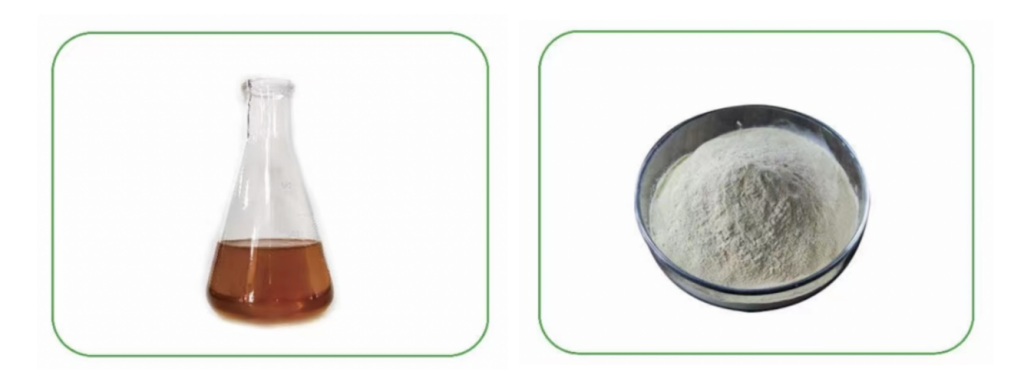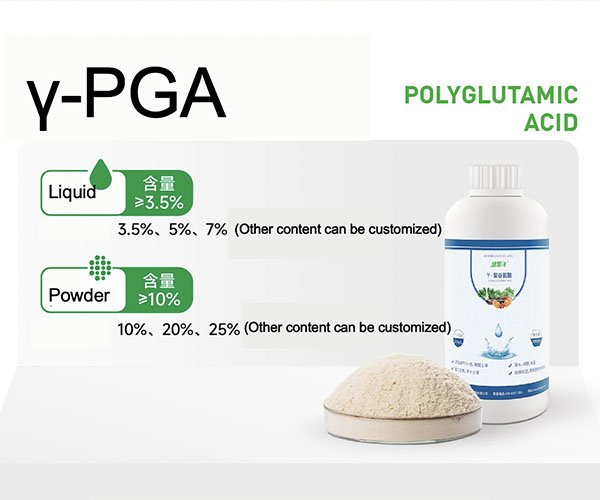Pea-based polyglutamic acid (γ-PGA)
- polyglutamic acid (γ-PGA)
- CAS NO.:25513-46-6
- Molecular formula: L-Glu-(L-Glu)n-L-Glu

Specifications
| Item | Specifications | |
| Appearance | powder | liquid |
| Content | 10%, 20%, 25% | 3.5%, 5%, 7% |
| Packing | 25 kg Cardboard drum or Kraft paper bag | 1kg bottle, 5kg bottle, 20kg drum |
Pea-based γ-polyglutamic acid is a special anionic natural polymer, which is a homopolyamide formed by amide bonds between α-amine groups and γ-carboxyl groups. Molecular weights vary from 50,000 to 3 million Daltons. With excellent water solubility and strong adsorption, it can be used as water retaining agent, heavy metal ion deactivator, flocculant, sustained release agent and drug carrier, etc.
Action Mechanism of pea-based polyglutamic acid:
The first stage: macromolecular type
- Improve soil aggregate structure, enhance soil air permeability, improve soil water retention and fertilizer retention
- Two-way adjustment of soil pH
- Chelate medium and trace elements, reduce soil EC value
- Passivation of heavy metals
The second stage: small molecule peptide type (biostimulation)
- Promote seed germination and capillary root growth
- Significantly improve plant photosynthesis
- Up-regulate the factors related to plant stress resistance and improve the stress resistance of crops
- Improve crop quality and yield
The third stage:
Monomeric glutamate is absorbed directly as an amino acid
Features of pea-based polyglutamic acid:
1. γ-PGA super hydrophilic and water-retaining ability
When submerged in soil, a film forms on the surface of plant root hairs. This not only has the effect of protecting the root hair, but also is the best transportation platform for nutrients, water and nutrients to come into close contact. This makes the root hairs in the soil more efficient for improved dissolution, storage, transport and absorption of fertilizers. Prevent the precipitation of sulfate, phosphate, oxalate and metal elements, so that crops can more effectively absorb phosphorus, calcium, magnesium and trace elements in the soil. Promote crop root development and enhance disease resistance.
2. Pea-based polyglutamic acid can balance soil pH value
It has excellent buffering capacity for acid and alkali, which can effectively balance the pH value of soil and avoid the acidic soil caused by long-term use of chemical fertilizers.
3. γ-PGA can bind and precipitate toxic heavy metals
It has excellent chelating effect on toxic heavy metals such as Pb2+, Cu2+, Cd2+, Cr3+, Al3+, As4+.
4. γ-PGA can enhance plant disease resistance and stress resistance
Integrates plant nutrients, water-active components in the soil, and enhances resistance to symptoms caused by soil-borne phytopathogens.
5. Pea-based polyglutamic acid can promote production increase
It can rapidly increase the production of agricultural products such as tea, fruits and vegetables, and the increase in output can reach 10-20%.


